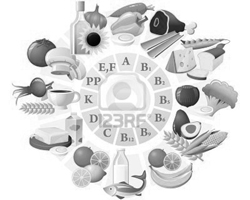A Daily Dose of Vitamin Goodness
 The change of seasons means saying goodbye to the more mild autumn and saying hello to the artic chill of winter and all that comes with it: freezing temperatures, colds, the flu, stuffy noses and more. Health.org suggests incorporating a new routine of vitamins and minerals into your diet each season. Research shows that the body needs a minimum amount of vitamins and minerals each day to remain healthy and to function properly.
The change of seasons means saying goodbye to the more mild autumn and saying hello to the artic chill of winter and all that comes with it: freezing temperatures, colds, the flu, stuffy noses and more. Health.org suggests incorporating a new routine of vitamins and minerals into your diet each season. Research shows that the body needs a minimum amount of vitamins and minerals each day to remain healthy and to function properly.
University Professor Mary Harris, Director of the Monmouth Area Vegetarian Society, said depending on a person’s nutrition, there is an importance to taking certain vitamins to supplement one’s diet. “Even a person who partakes in good nutrition is almost always deficient in certain vitamins and minerals,” Harris said. “However, good nutrition is number one, and combining that with the appropriate vitamins is the appropriate thing to do. Supplementation in combination with a proper diet is really essential. One without the other is not as beneficial. If a person eats a horrible diet, but takes a multivitamin, they are missing the mark.”
At first glance, a shelf of vitamins may seem overwhelming with variety. How do people know which types to choose? The Cornell University Chronicle states that vitamins are divided into two categories: fat-soluble and water-soluble. Fat-soluble vitamins are found in foods containing fats and oils and are stored in body fat. Water-soluble vitamins dissolve in water and mix easily in the blood. Some vitamins are antioxidants—chemicals that prevent damaging changes in cells and may help protect against cancer, heart disease, and aging.
Consumerreports.org lists the pros and cons of vitamins, mainly indicating that vitamins serve as buffers in the event that your diet does not fully meet your daily requirements. According to the site, some popular brands of vitamins include Centrum, Nature Made, Nordic Naturals, and Twin Lab. Local vitamin shops such as The Vitamin Shoppe on Route 36 in Eatontown, Walgreens on Route 26 in West Long Branch, and Ace Pharmacy located on Broadway in Long Branch offer a variety of vitamin brands for consumers to choose from.
According to the Harvard School of Public Health, the key components you must look for in a supplement are the vitamins B6, B12, D, E and folic acid. Studies performed in the school show that vitamin A is responsible for repair and restores the growth of tissues, B6 vitamins promote healthy skin and are the building blocks of protein, vitamin B12 maintains a healthy nervous system and increases energy, vitamin D is required for healthy bones and joints, vitamin C builds immunity, and vitamin E aids in bringing nourishment to cells. In addition, folic acid may lower the risk of heart disease, colon cancer, and breast cancer.
While taking supplements is a straight-forward approach to get your vitamins and minerals there are other options as well. “A balanced diet normally supplies sufficient vitamins,” said Rose Knapp, Assistant Professor in the School of Nursing and Health Studies and professional nurse practitioner. Knapp mentions that foods that are rich in Vitamin D include omega 3 fish oils, orange juice, soy milk, low fat milk, and oatmeal all of which can help supply your body with the proper amount of Vitamin D.
The Environmental Working Group lists foods like carrots, leafy greens, peppers and citrus fruits to maintain good vision, immunity and dental health, respectively. Brian Haliskoe, senior, said the only vitamin he takes is vitamin C, and only if he feels a cold coming on. Otherwise Haliskoe says that he doesn’t believe in taking supplements and opts to get his nutrients the old-fashioned way, through his daily diet.
However, serious disorders and deficiencies can still develop if the diet does not meet your body’s needs. According to The Vitamin D Council.org, the common causes of these vitamin deficiencies include poor eating habits, alcoholism, emotional stress, the improper absorption of vitamins and minerals, the intake of medicines that interfere with the ingestion of vitamins and lack of exposure to sunlight.
However, serious disorders and deficiencies can still develop if your diet does not meet your body’s needs. According to vitamandcouncil.org, the common causes of these vitamin deficiencies include poor eating habits, alcoholism, emotional stress, the improper absorption of vitamins and minerals, the intake of medicines that interfere with the ingestion of vitamins, and lack of exposure to sunlight.
Nicole Andretta, senior, said that she takes a multi-vitamin, calcium, and echinacea, which she purchases at the Vitamin Shoppe or Vitamin World. “I try to take them every day to boost my immunity levels,” said Andretta.
However, be sure to abide by the old adage “everything in moderation” when it comes to taking vitamin and mineral supplements. According health.org, when taken in excess, the fat-soluble vitamins A, D, E and K are stored in body fat tissues. This can lead to toxic buildup in the liver, brain and heart. Excess amounts of water-soluble vitamins, on the other hand, are less hazardous because they are eliminated from the body in the urine. Before starting a vitamin regimen, it is important that you speak with your doctor or healthcare physician.
PHOTO COURTESY of 123rf.com


